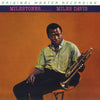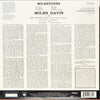



Miles Davis - Milestones (Mono, Ultra Analog, Half-speed Mastering)
ORDER LIMITED TO ONE ITEM PER CUSTOMER
Miles Davis – trumpet, piano (on "Sid's Ahead") [click here to see more vinyl featuring Miles Davis]
Julian "Cannonball" Adderley – alto saxophone [click here to see more vinyl featuring Cannonball Adderley]
John Coltrane – tenor saxophone [click here to see more vinyl featuring John Coltrane]
Red Garland – piano (except on "Sid's Ahead") [click here to see more vinyl featuring Red Garland]
Paul Chambers – double bass [click here to see more vinyl featuring Paul Chambers]
Philly Joe Jones – drums [click here to see more vinyl featuring Philly Joe Jones]
Written by Miles Davis (A2), Jackie McLean (A1), Dizzy Gillespie (A3), John Lewis (A3), Thelonious Monk (B3)
B2 is a traditional song arranged by Ahmad Jamal
1 LP, standard sleeve
Limited numbered edition
Original analog Master tape : YES
Half-speed Mastering
Gain 2™ Ultra Analog
Heavy Press : 180g
Record color : black
Speed : 33 RPM
Size : 12'’
Mono
Studio
Record Press : RTI
Label : MOFI
Original Label : Columbia
Recorded February 4 and March 4, 1958 at Columbia 30th Street Studio, New York City
Remastered by Krieg Wunderlich, Shawn R. Britton
Originally released in 1958
Reissued in 2013
Tracks:
Side A :
- Dr. Jekyll
- Sid's Ahead
- Two Bass Hit
Side B :
- Milestones
- Billy Boy
- Straight, No Chaser
Reviews :
"What is immedately noticeable upon listening to Miles Davis' classic first -- and only -- album with his original sextet is how deep the blues presence is on it. Though it's true that the album's title cut is rightfully credited with introducing modalism into jazz, and defining Davis' music for years to come, it is the sole selection of its kind on the record. The rest is all blues in any flavor you wish you call your own. For starters, there's the steaming bebop blues of "Dr. Jackle," recorded in 1955 for a Prestige session with Jackie McLean. Davis is still in his role as a trumpet master, showing a muscularity of tone that reveals something more akin to Roy Eldridge or Louis Armstrong than Dizzy or Fats Navarro. The tempo is furious, as all the members of the sextet solo except for Jones. The saxophonists trade choruses and come off sounding like mirrored images of one another in the slower, post-bop blues that is "Sid's Ahead," which is followed by "Two Bass Hit," written by Dizzy and John Lewis. It's an off-kilter blues with a wide middle section, no doubt for Lewis' piano to fill. But then comes "Milestones" with its modal round and interval, where harmony is constructed from the center up. It is a memorable tune for not only its structure and how it would inform not only Davis' own music, but jazz in general for the next seven years. The album's closer is Monk's "Straight, No Chaser," which became a signature tune for the sextet even when Garland and Jones left to be replaced by Bill Evans and Jimmy Cobb, and later Evans by Wynton Kelly." AllMusic Review by Thom Jurek
Ultra Analog™ : The GAIN 2 Ultra Analog™ Series stems from the use of the Gain 2 system, mastered at half speed from the original master tapes where possible, capturing and uncovering as before undiscovered sonic information.
Half-speed mastering. In half-speed mastering, the whole process is slowed down to half of the original speed. A typical 33 1/3 rpm record is cut at 16 2/3 rpm. The source material is also slowed down (reducing the pitch in the process) meaning the final record will still sound normal when played back. Slowing the whole process down allows more time, which means the end result sounds better and is more efficient — allowing engineering to minimize the effects of inherent limitations within the vinyl format. The result is a more accurate and more open high-frequency response in the half speed vinyl when compared with a normal speed recording.
Ratings :
AllMusic : 5 / 5 , Discogs : 4,56 / 5


